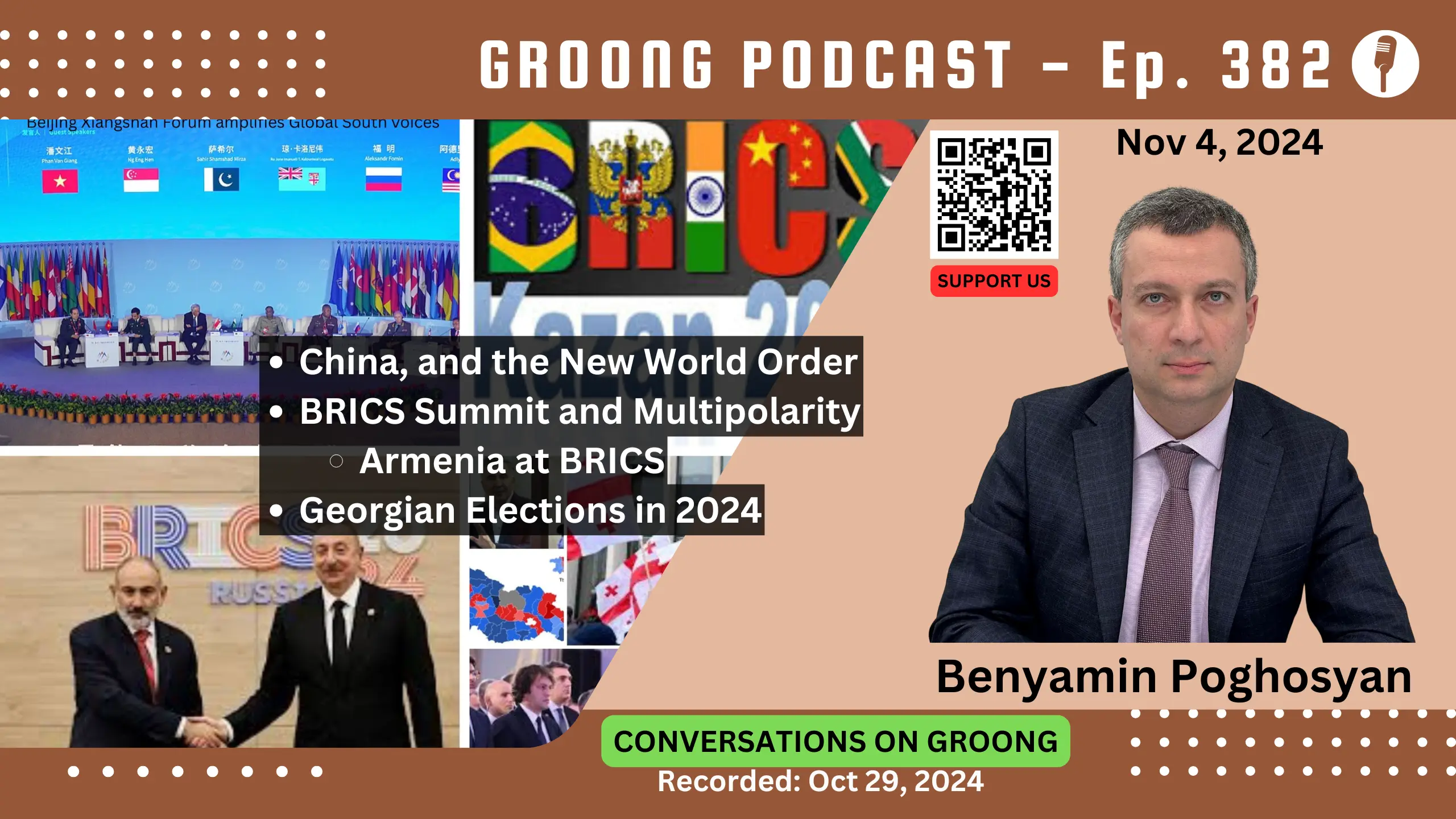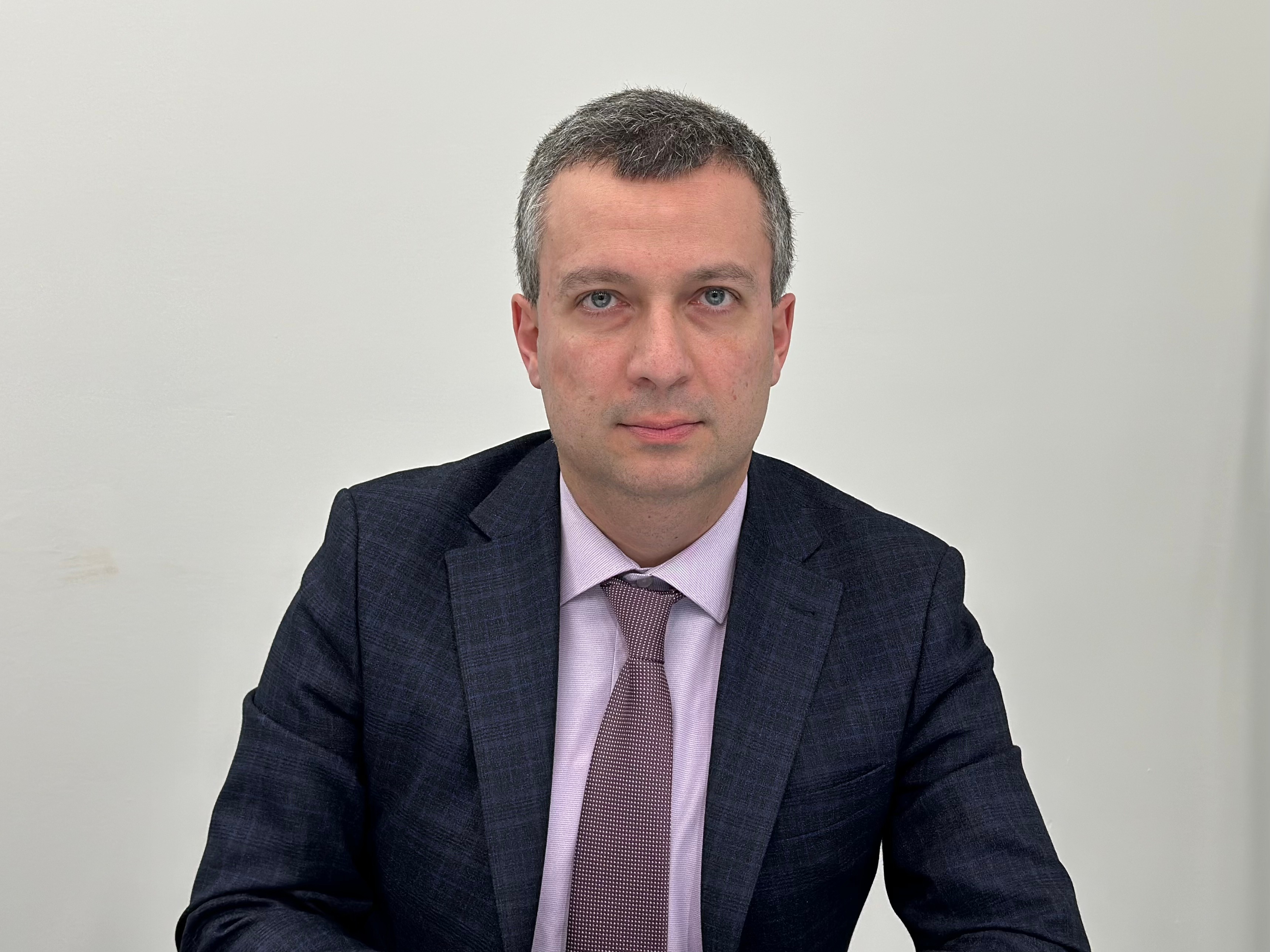Benyamin Poghosyan - China, BRICS, New World Order, Armenia in Kazan, Georgian Elections in 2024 | Ep 382 - Nov 4, 2024 [EP382]
Posted on Monday, Nov 4, 2024 | Category: China, World Order, Georgia | Series: cog
Groong Links:
Guest:
Topics:
- China, and the New World Order
- BRICS Summit and Multipolarity
- Armenia at BRICS
- Georgian Elections in 2024
Episode 382 | Recorded: October 29, 2024
Show Notes
China, BRICS, New World Order, 2024 Georgian elections
In recent years there have been a lot of discussions at academic and expert level, and also in political circles, about the transformation of the current world order from the unipolar system, which emerged after the end of the Cold War in 1991, into a more complex multipolar security architecture. China, as well as BRICS, are viewed as driving forces of this transformation.
China and the New World Order
You recently attended The 11th Beijing Xiangshan Forum in China back in September. This event is sponsored by the China Association of MIlitary Science, it has links with the Chinese defense department, and this year it brought together participants from over 90 countries.
- Benyamin’s panel discussion about Narratives and Communication in Modern Wars.
- US-China Relations
- The Global South
- International Conflict Resolution
- International Arms Control
- AI, Emerging Technologies
- Multipolarity and the Evolving World Order
- SCO+ - Shanghai Cooperation Organization
- …And much more.
Questions:
- What were your key takeaways from the Beijing Xiangshan Forum?
- How does China view the South Caucasus in its worldview?
Since the war in Ukraine, China and Russia have struck up a strong partnership in defense of their common interests against the West.
Questions:
- Do China and Russia have identical interests, or are there any differences?
- What is the Chinese role and interest in fostering a multi-polar world order?
BRICS and Multipolarity
BRICS Summit in Kazan
Top leaders from over 36 countries convened in Kazan, Russia, for the annual BRICS summit. This organization has gained a lot of traction in the past 5-6 years, as it promises an alternative to Western-led governance platforms, whether in politics, finance, or other aspects of international rule.
Notes:
- Summit happened
- Was well attended
- Saudi Arabia didn’t attend at the executive leader level (the FM attended)
- Brazil’s Lula didn’t attend because of medical reasons
- Western media did everything to present it as a gathering of “Putin allies” instead of a legitimate meeting of an international organization
- Even Turkey’s Erdogan, a NATO member, attended
- Aliyev, Pashinyan attended
- There is a significant line-up of countries that want to become members
- Brazil vetoed Venezuela’s membership
- Summit resolution doesn’t mention Ukraine at all
Questions:
- What is the implication of BRICS recent extension. Currently, BRICS has 9 permanent members, and during the summit in Kazan, an agreement was reached to add 13 countries as partners, among them Turkey. What is the role of BRICS in the emerging multipolar world?
- What is the significance of the Brazil veto of Venezuela’s membership?
- There seemed to be a meeting between Modi of India and Xi of China. Is a potential rapprochement between India and China in the making?
- Could India and/or China veto Turkey’s membership? What about Azerbaijan?
BRICS is rolling out an alternative to the Western controlled SWIFT banking system, and also moving away from dollar-denominated international trade and commerce.
Questions:
- Can you help us understand the significance of this?
- Because this is clearly a concern for the US. Trump has stated that if elected, he will impose a 100% tariff on trade with any country that moves away from dollar-denominated international trade.
Armenia at BRICS
Pashinyan attended the BRICS summit in Kazan and held negotiations with President Aliyev.
Questions:
- What do these changes in world order mean for Armenia?
- What role could BRICS play for Armenia?
Georgia Elections 2024
On October 26, parliamentary elections took place in Georgia, According to official results, the ruling party Georgian Dream got around 54 percent of the votes, while 4 opposition parties overcame the 5 percent threshold. However, US Secretary of State Anthony Blinken echoed various Western observers (OSCE ODIHR, representatives of the NATO Parliamentary assembly, PACE, European Parliament) by calling for a full investigation into “breaches of international norms” during the elections.
So that is the line that Georgian president Salome Zourabishvili and the opposition parties are pushing and also alleging that there has been Russian interference, without providing any supporting evidence. She and umbrella civil society NGO “My Vote” are alleging systematic and massive voter fraud affecting 300,000 votes, and demanding the annulment of the election results.
Four opposition parties cleared the 5% parliamentary threshold, so the Georgian parliament will be composed of what appears to be a healthy five political parties. A government that cleared the 50% threshold but did not achieve supermajority in the parliament, a healthy opposition that can build coalitions to influence the government, and an election process that went, by and large, peacefully.
Regardless, as predicted, Zourabishvili, the opposition, and the NGO industry are rejecting the results.
Questions:
- Why were these elections painted as either a choice between Russia and the West, or between war and peace?
- What happens now, with the opposition taking a rigid, hardline stance on the outcome of the election? Is there still a potential for violence and even political instability in Georgia, as a result of this standoff between government and opposition?
- What are the implications for Armenia?
Wrap-up
That’s our show! We hope you found it useful. Please find us on Social Media and follow us everywhere you get your Armenian news.
Thanks to Laura Osborn for the music on our podcasts.
Guests

Benyamin Poghosyan
Dr. Benyamin Poghosyan is a Senior Research Fellow at APRI Armenia, a Yerevan based think tank,and the Chairman of the Center for Political and Economic Strategic Studies. He has served as the vice president for research and head of the Institute for National Strategic Studies at the National Defense Research University in Armenia. Dr. Poghosyan was a Distinguished Research Fellow at the US National Defense University College of International Security Affairs. He is a graduate from the US State Department Study of the US Institutes for Scholars 2012 Program on US National Security Policy Making. He holds a PhD in history and is a graduate from the 2006 Tavitian Program on International Relations at Fletcher School of Law and Diplomacy.
Hosts

Asbed Bedrossian
Asbed Bedrossian is an IT professional, and for years oversaw the central IT enterprise infrastructure and services at USC. His decades of experience spanned across IT strategy, enterprise architecture, infrastructure, cybersecurity, enterprise applications, data center operations, high performance computing, ITSM, ITPM, and more.
Asbed founded the Armenian News Network Groong circa 1989/1990, and co-founded the ANN/Groong podcast in 2020.

Hovik Manucharyan
Hovik Manucharyan is an information security engineer who moved from Seattle to Armenia in 2022. He co-founded the ANN/Groong podcast in 2020 and has been a contributor to Groong News since the late 1990s.
Disclaimer: The views expressed by Hovik Manucharyan on the ANN/Groong podcast are his own and do not necessarily reflect the opinions of his employer or any other organization.